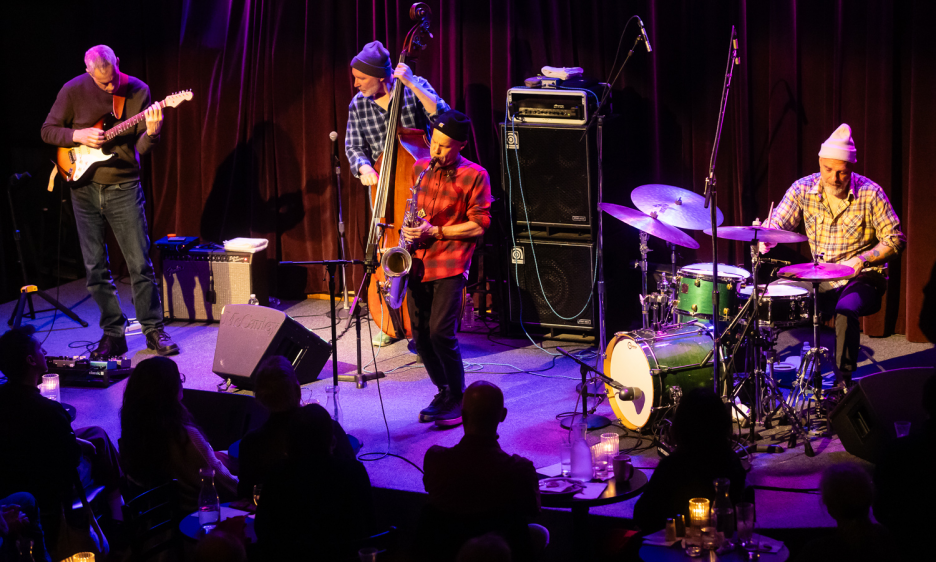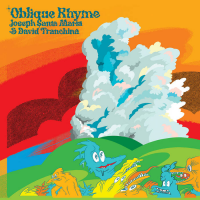Home » Jazz Articles » Live Review » The Bad Plus at Jazz Alley
The Bad Plus at Jazz Alley

Courtesy Lisa Hagen Glynn
Jazz Alley
Seattle, Washington
May 13, 2025
The Bad Plus is a band, and a successful brand in the music world. They have a litany of successful recording and performance credits to their history, achieving amazing success while employing an approach to jazz that is perhaps odd and certainly uncompromising.
Beginning in 2000 as a piano trio, bassist Reid Anderson and drummer Dave King teamed with pianist Ethan Iverson, largely performing covers of tunes from outside of jazz, many extracted from rock and pop realms. This "jazz treatment" of sorts was not born of a premise as simple as this, however. Within the music was a deep commitment to exploring tunes inside and out, with an open, conversational intent. The band attracted a faithful following, and continued to do so when Iverson bowed out in 2017, ceding the piano chair to Orrin Evans, himself a force in modern jazz. The overall sound of the band did change significantly, with Evans' rhythmic and harmonic sensibilities realigning to some degree, the melodic language of the band. Inevitably, Evans returned to his brilliant and tenured solo career. In 2024, Anderson and King reimagined what The Bad Plus could be, inviting the genius guitarist Ben Monder and the ever-eclectic tenor saxophonist / clarinetist Chris Speed into the fold. Currently touring in support of their new album Complex Emotions (Mack Avenue, 2024) under this alignment, the band has been making waves in live performances around the globe, including this stop at Seattle's iconic Jazz Alley.
The 90-minute set was an exercise in vibrant intensity and spatial freedom. With Monder manning a solid body electric guitar with a wide array of pedals and effects along with the acoustic instruments employed by his three mates, the band brought a particular brand of thunder to the 400-seat room, at a volume level that was accommodating not only to musical dynamics, but to human sensibilities.
The Monder effect was evident from the start, decorating a Reid/King vamp with a lightning quick cascading run in unison with Speed. King's "Casa Ben" was the vehicle, one that evolved into an atmospheric bent provided by Monder's intricate finger-style harmonic work. For his part, King seems to have found more space within which he can innovatively maneuver, with less of a defined perimeter guarding the harmonic balance of the band. This was evident throughout the performance, as King's energy and virtuosity broke new ground in motion.
Anderson's "French Horns" is the most oft-played radio tune on the new album, and the band dug right in after the more ethereal trappings of the opener. Despite a minor feedback hiccup in the bass setup, Anderson and Monder provided the most intense barrage of the evening, backed by King's unrelenting and vibrant charge.
"Deep Water Sharks" is a title inspired by the mystery of sharks who dwell in the ocean's depths, in almost complete darkness, away from the common view of humanity. Anderson's humorous and witty account of the tune's origins was a fun moment, and in essence, a plenty darn accurate description of what was to come. The tunes played over the course of the set amounted to melodic sketches that lead to places unknown, or more explicitly, places unexplored. Over the course of a quarter century, King and Anderson have delighted in finding new ways to maneuver through territory familiar, yet in some ways infinitely unfamiliar. Monder's enormous presence and Speed's gently rolling yet constantly probing melodics add what amounts to a broader spectrum of sound to embrace that challenge. As core members of the band, Anderson and King are that foundational, yet constantly moving factor that are to The Bad Plus as Joe Zawinul and Wayne Shorter were to the evolving personnel that traveled through Weather Report. But unlike the Zawinul/Shorter combination, Anderson and King are playing traditional rhythm section instruments. The melodies they create come from that base. It eased the transition from a single piano voice to the multiplicity of sounds emanating from Monder and Speed.
Monder's "Li Po," a modal, meditative piece was the evening's finale, and perhaps its musical highlight. With Anderson employing electronics, Monder created a textured galaxy of sound through pedals and artful use of feedback. The melody line arrived in a very visual sense, with guitar and tenor saxophone merging as a singular rising entity. This part of the show revealed a striking balance between orchestral and free music, utilizing the elements at hand to create a musically ambient experience for the audience. It magnified what had been the case all night—that the audience is an important part of the performance. It as well revealed the stark differences between the four members of the band and how they could arrive at a beautiful understanding about what surrounds them and somehow internalize that wisdom so it may be shared once again. Simply put, over the past few years, Anderson and King have found something special. One can only hope they take care of it and make it last.
Tags
Live Review
The Bad Plus
Paul Rauch
United States
Washington
Seattle
Reid Anderson
dave king
Ethan Iverson
Orrin Evans
Ben Monder
Chris Speed
Jazz Alley
Joe Zawinul
Wayne Shorter
Weather Report
About The Bad Plus
Instrument: Band / ensemble / orchestra
PREVIOUS / NEXT
The Bad Plus Concerts
Mar
27
Fri
Support All About Jazz
 All About Jazz has been a pillar of jazz since 1995, championing it as an art form and, more importantly, supporting the musicians who make it. Our enduring commitment has made "AAJ" one of the most culturally important websites of its kind, read by hundreds of thousands of fans, musicians and industry figures every month.
All About Jazz has been a pillar of jazz since 1995, championing it as an art form and, more importantly, supporting the musicians who make it. Our enduring commitment has made "AAJ" one of the most culturally important websites of its kind, read by hundreds of thousands of fans, musicians and industry figures every month.


























